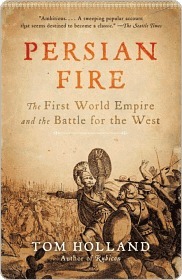More on this book
Community
Kindle Notes & Highlights
by
Tom Holland
Read between
May 6 - May 15, 2023
As subjects of a foreign king, the Athenians would never have had the opportunity to develop their unique democratic culture. Much that made Greek civilisation distinctive would have been aborted. The legacy inherited by Rome and passed on to modern Europe would have been immeasurably impoverished. Not only would the West have lost its first struggle for independence and survival, but it is unlikely, had the Greeks succumbed to Xerxes’ invasion, that there would ever have been such an entity as ‘the West’ at all.
Monotheism and the notion of a universal state, democracy and totalitarianism: all can trace their origins back to the period of the Persian Wars. Justifiably it has been described as the axis of world history.
Darius, testing the potential of his religion to its limits, had promoted a dramatic innovation. Contained within it were the seeds of some radical notions: that foreign foes might be crushed as infidels; that warriors might be promised paradise; that conquest in the name of a god might become a moral duty.
The leading Spartans called themselves ‘Heraclids’ – and they laid claim, as the heirs of Heracles, not only to Lacedaemon but to the dominion of much of Greece.
Revolution, as they were the first people in history to discover, could best be buttressed if it was transfigured into myth.
Merciless and universal discipline was to teach every Spartan, from the moment of his birth, that conformity was all.
For the Spartans, in their concern to mould the perfect citizen, had developed a truly bizarre and radical notion: the world’s first universal, state-run education system.
Strict limits on his conversation would be set, to foster the terse style of speech known all over Greece as ‘Laconic’.
the traditions that define a people, that they cling to, that they love, can also, if cunningly exploited by a conqueror, serve to enslave them.
As the Persians understood to a degree never before rivalled, information was dominance. Master information, and master all the world. The ultimate basis of Persian greatness, then, was not its bureaucracy, nor even its armies, but its roads.


